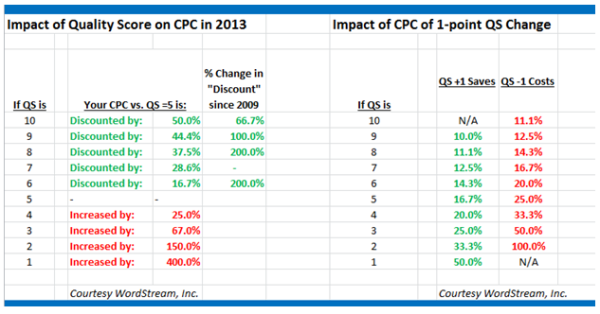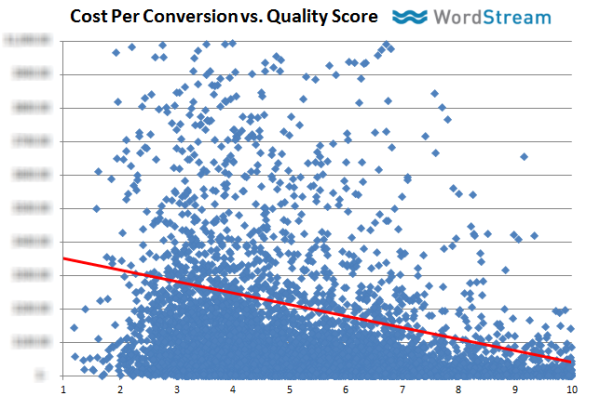All Hail Quality Score – King Of The AdWords KPIs!
[youtube]https://youtu.be/obYtQaquTFU[/youtube] The high-level relationship between Cost-Per-Click and Quality Score is well known: the higher your Quality Score, the lower your cost per click. Earlier this year, I published some research data showing how, as average Quality Scores have drifted lower over the years, the cost-per-click savings associated with above-average Quality Score keywords is today worth […]
[youtube]https://youtu.be/obYtQaquTFU[/youtube]
The high-level relationship between Cost-Per-Click and Quality Score is well known: the higher your Quality Score, the lower your cost per click.
Earlier this year, I published some research data showing how, as average Quality Scores have drifted lower over the years, the cost-per-click savings associated with above-average Quality Score keywords is today worth up to 200% more than it was just 4 years ago!
Here’s a quick summary of the relationship between Quality Score and Cost-Per-Click in 2013:

Based on this data, it would seem obvious that we should all be trying to optimize our Quality Scores. Right?
It’s The CPA, Stupid!
Not so fast. Quality Score detractors are quick to point out that it’s the cost-per-acquisition (CPA) and not cost-per-click (CPC) that matters.
And they’ve got a point there. Ultimately, PPC really is all about the cost of customer acquisition. If you can acquire customers profitably at a lower CPA, who the heck cares if your CPC is high or if Google says your keyword’s Quality Score is 2/10? Duh!
But is optimizing for CPA really any different from optimizing for Quality Score? Or does optimizing for Quality Score result in both lower average CPCs and CPAs?
Understanding The Relationship Between Cost Per Conversion & Quality Score
For my article this week, I wanted to quantify the relationship between the average cost per conversion and Quality Score. To do this, I manually compiled CPA data from thousands of campaigns across several hundred of my client accounts, representing about $100 million in annualized spend.
I then plotted the average cost-per-conversion of each campaign vs. the impression weighted Quality Score for that campaign. Here’s what that looks like:
Based on my analysis, I confidently conclude that there is indeed a very strong relationship between average cost per conversion and average Quality Score.
In other words, the higher your Quality Score, the lower your CPA will be on average. Therefore, optimizing for Quality Score and CPA are essentially the same thing. Here’s the data in a table form:
The preceding table illustrates the kinds of discounts (or penalties) you can expect to see on your average CPA based on your Quality Score for a given keyword, relative to the average Quality Score of 5/10 these days.
In a nutshell, for every Quality Score point above the average 5/10 score, your CPA will drop by 16% on average. Conversely, for every Quality Score point below the average of 5/10, your CPA will rise by 16%.
A few months back, Michael Wiegand at Portent did a similar study and found that for each point that your QS goes up, there was an average CPA reduction of 22%. The main difference is that my study is compiled using about 100x more data.
It’s also worth pointing out that I didn’t find a big difference in average conversion rates vs. Quality Scores. I found that high Quality Score keywords converted only very slightly better than low Quality Score keywords, meaning that the huge reductions in CPA were being primarily driven by the CPC savings (or increased click costs) — which are a direct result of your Quality Score.
A Note About Averages & Lazy PPC Marketers
With so much evidence pointing to a strong relationship between CPA and Quality Score, why do many SEMs choose not to optimize accounts for Quality Score – or basically just click-through rate – which is essentially the same thing? I can think of at least two reasons.
First, it’s important to note that when working with averages, you’ll always have values that are either above or below that average. Thus, it’s completely possible to look in any one account and find cases where lower Quality Score keywords have lower CPAs than higher Quality Score keywords. In these cases, it most certainly makes sense to optimize for CPA.
However, as you look at more and more keywords and spend across hundreds or thousands of accounts, you’ll find that the find that on average, the higher your Quality Score is, the lower your CPA will be.
Another thing that I see happening here is just old-fashioned complacency and laziness. The sad reality is that while most AdWords managers claim to be super proactively managing client accounts, not very much is actually being done. It’s far easier to dismiss Quality Score as being irrelevant than it is to actually do all of the hard work that is necessary to improve your click-through rates and Quality Scores.
Other Miscellaneous Survey Methodology Notes
Just a few final points about my data collection methods:
- Yes, I included branded terms in the study
- Yes, branded terms on average have higher Quality Scores and Lower CPA’s
- No, the removal of branded terms didn’t fundamentally alter the relationship between CPA and Quality Score
- Yes I’ve lumped together companies in every imaginable industry
- When I slice the data by industry, the relationship between CPA and Quality Score still held
Summary: All Hail Quality Score, King Of The AdWords Realm!

Image courtesy HBO
In my article today, I hope I’ve put to rest the debate over the importance of optimizing an account for Quality Score, because it has such a huge impact on both CPA and CPC.
And if Quality Score is king of the AdWords realm, then the Hand of the King is account activity – it’s only through thoughtful and ongoing PPC optimization work that we’re able to realize improvements in CTR and Quality Score.
Let me know what you think about all this stuff in the comments below!
Contributing authors are invited to create content for Search Engine Land and are chosen for their expertise and contribution to the search community. Our contributors work under the oversight of the editorial staff and contributions are checked for quality and relevance to our readers. The opinions they express are their own.
Related stories
New on Search Engine Land

